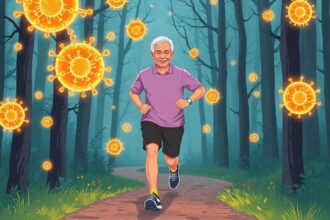Explore the science of immunosenescence and evidence-based strategies to reverse age-related immune decline, including nutrition, exercise, and emerging therapies.
Immunosenescence, the age-related decline in immune function, increases vulnerability to infections and diseases. Learn how to combat it with science-backed strategies.
Understanding Immunosenescence: The Aging Immune System
Immunosenescence refers to the gradual deterioration of the immune system that occurs with aging. This process makes older adults more susceptible to infections, chronic diseases, and cancer. According to a 2020 study published in Nature Immunology
, immunosenescence is characterized by a decline in the production of naive T cells, reduced diversity of the immune repertoire, and chronic low-grade inflammation known as inflammaging.
The Impact of Immunosenescence on Health
As the immune system weakens, the body becomes less effective at fighting off pathogens. Dr. Janet Lord, a professor of immune cell biology at the University of Birmingham, explains, Older adults are more likely to experience severe outcomes from infections like influenza and COVID-19 due to immunosenescence.
Additionally, the risk of autoimmune diseases and cancer increases as immune surveillance declines.
Nutrition: Fueling Immune Resilience
Diet plays a crucial role in supporting immune function. Key nutrients include:
- Zinc: Found in shellfish, legumes, and seeds, zinc is essential for immune cell development and function.
- Selenium: Present in Brazil nuts and fish, selenium enhances antioxidant defenses.
- Vitamin D: Sunlight exposure and fortified foods help maintain optimal levels, which are critical for immune regulation.
A 2019 review in Nutrients
highlighted that a Mediterranean diet, rich in fruits, vegetables, and healthy fats, can mitigate immunosenescence.
Exercise: A Natural Immune Booster
Regular physical activity has been shown to enhance immune function. Strength training and aerobic exercise improve circulation, reduce inflammation, and promote the production of immune cells. A 2021 study in Frontiers in Immunology
found that moderate exercise can delay the onset of immunosenescence by maintaining thymic function.
Lifestyle Interventions: Stress and Sleep
Chronic stress and poor sleep exacerbate immune decline. Techniques like mindfulness meditation and maintaining a consistent sleep schedule can help. Dr. Sheldon Cohen of Carnegie Mellon University states, Stress reduction and quality sleep are non-negotiable for immune health.
Emerging Therapies: Senolytics and Immunomodulators
Senolytics, drugs that target and eliminate senescent cells, are showing promise in reversing immunosenescence. Compounds like quercetin and beta-glucans are also being studied for their immunomodulatory effects. A 2022 clinical trial published in Science Translational Medicine
demonstrated that senolytic therapy improved immune function in older adults.
Practical Tips for Immune Health
To maintain a robust immune system as you age:
- Eat a balanced diet rich in immune-supportive nutrients.
- Engage in regular physical activity.
- Manage stress through mindfulness and relaxation techniques.
- Prioritize sleep hygiene.
- Consider discussing emerging therapies with your healthcare provider.
By adopting these strategies, you can enhance your immune resilience and enjoy a healthier, more vibrant life as you age.




